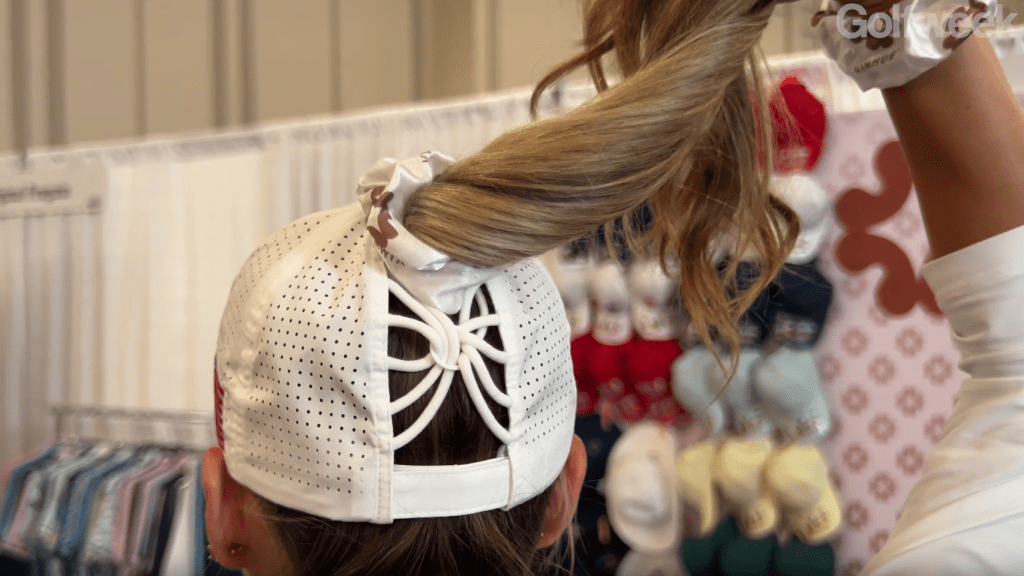[ad_1]
 Anna Kittelson, the manager of adaptive golf at the Golf Association of Philadelphia, likes moving fast. Since joining the association full-time in January, Kittelson is forging forward with its latest initiative that will bring competitive and instructional elements of adaptive golf to GAP’s widespread region in 2024 like a downhill putt on Merion East’s fifth hole. “It was a lot of research in my internship,” she said. “And now we are in full ‘go’ mode.”
Anna Kittelson, the manager of adaptive golf at the Golf Association of Philadelphia, likes moving fast. Since joining the association full-time in January, Kittelson is forging forward with its latest initiative that will bring competitive and instructional elements of adaptive golf to GAP’s widespread region in 2024 like a downhill putt on Merion East’s fifth hole. “It was a lot of research in my internship,” she said. “And now we are in full ‘go’ mode.”
A University of Delaware graduate who earned All-Colonial Athletic Association first-team honors in her senior year and was runner-up in the CAA Championship, Kittelson has been interested in assisting individuals with disabilities since she volunteered at the Special Olympics as a teen. Her GAP internship, in 2023, focused on information gathering through personal meetings, a handful of tournament visits, and insane hours of research to ascertain “what everybody else is doing and what still needs to be done.”
Kittelson wisely relied on two “local” adaptive golf organizations to assist her with the complexities of planning and staging its first large and public-facing event: the GAP Adaptive Championship. The Eastern Amputee Golf Association (Bethlehem) and the Middle Atlantic Blind Golf Association (Philadelphia) are based in Pennsylvania and served as valuable resources. “I got to attend a lot of their events, and it made me so excited,” Kittelson said.
The inaugural GAP Adaptive Championship will be played October 14-15 at Lookaway Golf Club in Buckingham, Pennsylvania, and Doylestown (Pa.) Country Club. A 60-player, 36-hole competition will include overall champions as well as champions for all appropriate impairment categories. Kittelson said the GAP Adaptive Championship will be a World Ranking for Golfers with Disability (WR4GD) counting event and that “there will be fun stuff on practice days, and it will be a community-wide event.”
The series of instructional sessions is named “No Limits Clinics,” because there are no limitations in golf. Starting the year in a new job and executing an inaugural event about 10 months later is an exercise in intense organization, but Kittelson shakes off the daunting nature of the timeline. “I want it to go faster,” she said.
In addition to building a competition for golfers with disabilities, Kittelson faces another critical function: organizing free golf clinics for all people with disabilities. Equipment will be provided. Non-GAP members are welcome to attend. According to Kittelson, GAP has identified a “signature” element for its clinics: “All of our clinics are going to be strictly instructed by PGA professionals.”
The series of instructional sessions is named “No Limits Clinics,” because there are no limitations in golf. With hopes of 15 or more clinics spread throughout GAP’s far-ranging region, Kittelson plans to offer the opportunity to everyone. The first-year schedule will include summer and fall dates. Kittelson intends to continue the program into the winter months as well.
 Using census data, Kittelson was able to build a flexible spreadsheet for her planning. “Every other month an individual should have a clinic within an hour of where they live in the GAP region,” she said. Ideally, each clinic will be capped at 20 participants because of the required space for the practice range and putting greens. According to Kittelson, four or five GAP staff with as many as a handful of volunteers will be needed to operate each clinic.
Using census data, Kittelson was able to build a flexible spreadsheet for her planning. “Every other month an individual should have a clinic within an hour of where they live in the GAP region,” she said. Ideally, each clinic will be capped at 20 participants because of the required space for the practice range and putting greens. According to Kittelson, four or five GAP staff with as many as a handful of volunteers will be needed to operate each clinic.
Adam Benza of Hellertown, Pennsylvania, will serve as the lead instructor, she said. Benza has twice played in the USGA’s Adaptive Open, is a graduate of Penn State with a long and decorated résumé in adaptive golf and is the assistant coach of Lehigh’s women’s team. Using a combination of grassroots recruiting methods, Kittelson hopes to attract many athletes with disabilities who want to give golf a try.
“The market for people with disabilities to play golf is huge because people don’t realize golf is an option,” she said. “Nobody thinks of golf.” By opening the doors of golf to the community of individuals with disabilities, Kittelson hopes to create lifelong players who can, because of golf’s handicap system and use of multiple tees, find friends with whom to play.
She understands that the players need to be listened to when structuring GAP’s programming and she intends to lean on the already established organizations for input. Some have been in existence for more than 20 years and still are relatively unpublicized. “As the bigger organization, we are not here to reinvent the wheel,” she said. “We are here to aid and help and continue the growth that they have done on their own. We want to assist them, not take away from them.”
[ad_2]



